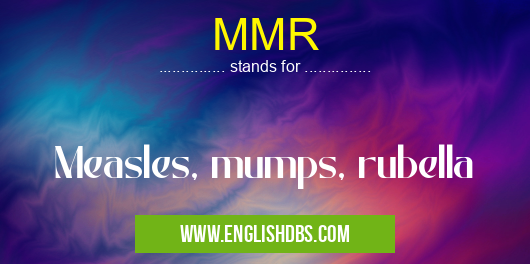What does MMR mean in CLINICAL MEDICINE
MMR stands for measles, mumps, and rubella – three separate viruses that cause serious childhood illnesses. Measles is a contagious virus that can lead to rash, respiratory illness, blindness, deafness, brain damage, and even death. Mumps can cause swollen salivary glands, painful swelling of the testicles in boys and men, deafness from nerve damage in one or both ears, inflammation of the brain and its lining (encephalitis), and swelling of the ovaries and breasts in women who have gone through puberty. Rubella is a virus that normally causes a mild illness with fever and rash in children; however it can be very serious if contracted by a pregnant woman as it can lead to miscarriage or birth defects such as deafness.

MMR meaning in Clinical Medicine in Medical
MMR mostly used in an acronym Clinical Medicine in Category Medical that means Measles, mumps, rubella
Shorthand: MMR,
Full Form: Measles, mumps, rubella
For more information of "Measles, mumps, rubella", see the section below.
Essential Questions and Answers on Measles, mumps, rubella in "MEDICAL»CLINICAL"
What is MMR?
MMR stands for Measles, Mumps, and Rubella. It is a vaccine that helps protect against these three illnesses. All three illnesses are highly contagious. By getting the MMR vaccine, you can help reduce the risk of getting or spreading any of these diseases.
Are there side effects from the MMR vaccine?
Most people who receive an MMR vaccination experience no side effects at all. However, some people may experience redness or swelling where the shot was given, as well as a mild fever or rash. These symptoms are generally mild and go away on their own after a few days. If you have any concerns, please speak to your doctor.
Is it safe for pregnant women to get the MMR vaccine?
No, pregnant women should not get the MMR vaccine due to possible risks to the fetus. Women who are planning to become pregnant should wait until after they give birth before getting vaccinated.
Who should get an MMR vaccination?
The Centers for Disease Control and Prevention (CDC) recommends that all children aged 12 months or older should receive two doses of the MMR vaccine which are typically administered four weeks apart. Many adolescent and adults may also benefit from receiving one dose of the vaccine if they have never been immunized or if it has been 10 years since their last dose.
When can I expect my child to be protected after getting vaccinated with an MMR shot?
Generally speaking, most people develop immunity about two weeks after receiving each dose of the vaccine. So it is recommended to wait two weeks between doses for maximum protection.
Can I still get measles if I had an MMR shot?
It is possible in rare cases to still contract measles even if you had an MMR shot; however this is very rare and usually only occurs when someone is exposed within 7-10 days prior to receiving their first MMR dose.
What other types of vaccines protect against measles?
In addition to the measles component in the MMR Vaccine, some individuals may opt for single antigen measles vaccines such as ProQuad or M-M-RVaxPro which are available at certain doctor’s offices.
Are there instances when someone should not receive an MMV vaccination?
Yes, individuals who have had life threatening allergic reactions following a previous dose of a measles containing vaccinate should not receive another dose. Also some individuals who take immune-suppressing drugs or those with serious HIV infections may not respond adequately to vaccines and thus would be advised against receiving one at this time..
What happens if I don’t get vaccinated with an MMV shot?
Not getting vaccinated puts you at risk for contracting these illnesses and passing them onto others who could be more vulnerable than yourself such as newborns and elderly persons whose immune systems may not be strong enough to fight off infection without help from vaccinations.
My child was recently exposed to someone who has measles, should they still get vaccinated?
Yes, it is recommended that anyone over 12 months old that has been exposed but never received a full course of vaccinations be given Immunoglobulin (IG) within 6 days following exposure in combination with having them complete both doses of their vaccinations series within 8 days following exposure.
Final Words:
In conclusion, MMR is an important abbreviation used to refer to three separate viruses resulting in childhood illnesses: measles, mumps and rubella. Vaccines are available to combat these viruses offering protection for infants and young children from becoming infected with potentially life-threatening complications associated with them. Receiving two doses of the MMR vaccine according to World Health Organization recommendation ensures reliable protection against any future contractions of measles, mumps or rubella disease in most cases where other methods of prevention are not available.
MMR also stands for: |
|
| All stands for MMR |
